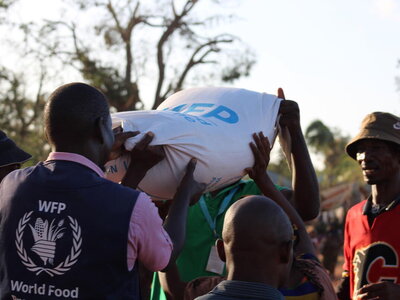Emergency
Mozambique
- 2.7 million
- people are food insecure
- 450,000
- earmarked for WFP support after severe flooding
- US$78.8 million
- is required for WFP life-saving assistance until April 2026
Mozambique is grappling with multiple, overlapping crises – conflict, displacement, flooding, drought and recurrent cyclones – that continue to threaten lives and livelihoods.
A total of 2.7 million people are food insecure and urgently need assistance. Of these, 1.6 million are in the northern provinces of Cabo Delgado, Nampula and Niassa, where communities rely on humanitarian support to survive and recover.
Severe flooding in central and southern Mozambique has affected nearly 700,000 people and forced over 100,000 into temporary accommodation centres. Around 1,500 km of roads are now impassable, disrupting key supply routes and isolating vulnerable groups.
The World Food Programmer (WFP) urgently requires US$32 million to deliver vital food and nutritional support, with a total of 450,000 people targeted.
This emergency is only compounding an alarming hunger crisis.
Nine years of conflict among armed insurgent groups in the north has displaced hundreds of thousands of people. WFP provides critical food assistance to 425,000 of the most vulnerable people affected by the conflict in the north.
Funding shortfalls have already forced WFP to reduce the number of Mozambicans supported in the north by 60 percent, compared to 2024. A complete halt in assistance is expected by May unless there is more funding.
What the World Food Programme is doing to respond to the Mozambique emergency
-
Response to floods
-
WFP is on the ground delivering life-saving food assistance to flood-affected families, reaching 31,000 people so far in temporary accommodation centres in Gaza Province. WFP is using all available resources, including amphibious vehicles, boats, trucks, aircraft and helicopters to reach a total of 450,000 people with food.
-
Northern emergency response
-
UNHAS

